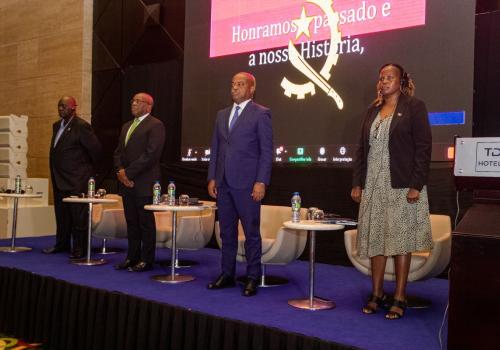The Southern African Development Community (SADC) has stepped up efforts to attract more Foreign Direct Investment (FDI) to the Region by participating at the 12th Edition of the Annual Investment Meeting (AIM) Global 2023 in Abu Dhabi, United Arab Emirates (UAE) from 8th – 10th May 2023 during which it showcased its programmes and projects to various key decision-makers and businesses who are willing to engage in sustainable partnerships, and benefit from a variety of features aimed at facilitating strategic networking and promote the SADC Region as the most attractive zone for business and investments in Africa.
Approximately 100 investors visited the SADC Exhibition booth from 8th to 10th May 2023. Twelve SADC Member States of Angola, Botswana, Democratic Republic of Congo (DRC), Eswatini, Lesotho, Mozambique, Madagascar, Malawi, Mauritius, Namibia, Seychelles, and Zimbabwe attended the AIM Global 2023.
The SADC Secretarial held the SADC Regional Focus Forum at the 12th Edition of AIM Global 2023 to attract FDI under the theme “Infrastructure Development in Support of Industrialisation and Regional Integration”. The SADC Regional Focus Forum hosted two High-Level Panel discussions on Coordination and Investment Opportunities for Unlocking the Development of Regional Infrastructure Projects; and on Industrial and Value Chains Development. The panel discussions were led by eminent speakers who presented on various topics in their fields of expertise, with the aim of attracting FDI to the Region.
Over 50 investors attended the SADC Regional Focus Forum, including the SADC Ambassadors from the D RC, Lesotho, and Zimbabwe based in the UAE, as well as the Secretary-General of the Organisation of African, Caribbean and Pacific States (OACPS).
In her opening remarks at the Forum, Ms Stella Chimwemwe Ng’oma, Director Investment Promotion and Facilitation, Malawi Investment and Trade Centre, said SADC desires to discuss good practice in public-private investment partnerships and create a mechanism to develop cross-cutting networks involving Member States, investors, bankers, development partners in order to re-engineer investment plans of Member States to be more catalytic and dynamic tools of investment attraction for sectoral development.
She said Member States recognise that despite SADC having made significant progress in regional infrastructure development, the economic transformation of the Region will require adequate and functioning infrastructure that will guide it towards front-loading industrialisation in the context of evolving technologies. This means that the Infrastructure Development in support of Regional Integration will aim towards interconnected, integrated, and quality seamless infrastructure and networks, including cross-border infrastructure, which will be pivotal in facilitating the movement of people, goods, services, and knowledge.
SADC adopted the Protocol on Finance and Investment in 2006 to foster investment in the Region. The Protocol outlines SADC policy on investment, encouraging Member States to enact strategies to attract investors and implement legislation that creates a favourable environment for investment. The SADC Industrialisation Strategy and Roadmap and its Action Plan call for deeper integration to facilitate increased inflow of FDI and integration into global value chains. Moreover, it calls on Member States to implement investment-friendly policies to attract FDI resources to increase productive capacity and facilitate technological and skills transfers.
Speaking at the same Forum, Ms Angela Pretorius, Chairperson of the SADC Subcommittee on Investment, said notable progress has been made in the area of investments in SADC, including the development of an Investment Policy Framework (IPF) to guide Member States in developing their National Action Plans for Investment (NAPI), and that FDI in SADC jumped to USD42 billion due to a large corporate reconfiguration which occurred in the Region.
SADC Member States made concrete steps to improve their investment climate and have started working towards ensuring that investment supports industrialisation and Small and Medium Enterprises (SME) development. According to World Bank, the Region has an average of 20% foreign investment restrictiveness, implying an 80% liberalization/attractiveness.
Attracting investment is central to the development and integration agenda of SADC, she said, and improving the investment and business environment to attract higher levels of investments, coupled with investment cooperation activities among private sector and Member States helps the Region to realise the SADC goals of deep regional integration, industrialisation and infrastructure development.
Ms Pretorius said facilitating investment for the SADC Region is crucial as it makes it easier for investors to establish or expand their investment and conduct their day-to-day business. One of the factors investors consider in making their investment decisions is the tax regime of a country. As such Member States are cooperating in harmonising the tax regime in the Region, mainly in three areas: tax agreements; indirect taxes; and tax incentives.
Participation at the 12th AIM Global 2023 was to explore areas of SADC-UAE collaboration built on mutual relationship, and boost investment opportunities in the Region, as well as attract FDI to the Region. The goal and intent of participating at the Investment Forum was to help SADC Member States to use “investment forum platforms” to improve their ability to attract private capital to invest in their national/regional investment plans; provide Member States with an opportunity to engage private sector investors and broadly highlight projects and programmes that are investor ready; and bring key public sector and private sector parties together to help them agree on projects for implementation and investment.
Through participating at the 12th AIM Global 2023, SADC will learn about the latest developments, FDI trends, projections and investment promotion strategies; network and connect with industry leaders and key stakeholders from other RECs and international communities; and explore investment opportunities in various sectors and get in touch with Chambers of Commerce and Industry and Business Councils from across the globe.

